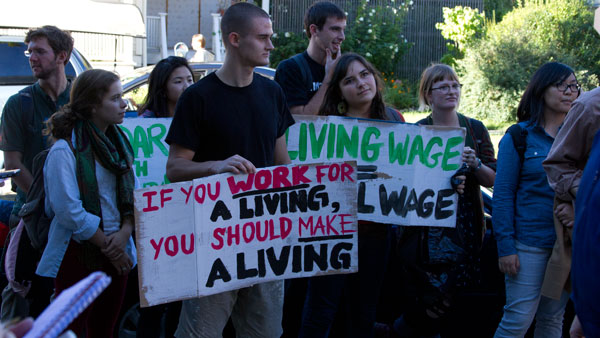The chants of 60 students and Ithaca community members echoed through the streets as they gathered Tuesday on Court Street, outside the Tompkins County Legislature meeting to rally for a living wage.
The event was led by Pete Meyers, coordinator of the Tompkins County Workers’ Center, and organized by the TCWC. After the rally, attendees were invited to join the group as it addressed the county legislature during the public comment section of the meeting.
The living wage is the minimum income necessary for a worker to be able to meet basic needs, like food and adequate shelter based on the cost of living in his or her area. The living wage in Ithaca is now $12.62, which is higher than both the federal living wage and the state minimum wage of $7.25. Tompkins County has been a certified living-wage employer since 2006.
Since the early 1990s, more than 120 municipalities have enacted living-wage laws, and the City of Ithaca is slated to become a living-wage employer by Oct. 1, which means that all city employees will earn a living wage.
About 35 members of Cornell Organization for Labor Action were also present at the rally. The group came with signs that read: “Living Wage = Moral Value,” “If you work for a living, you should make a living” and “Dignity and respect for our community.”
Junior Michelle Lim and sophomore Molly Becker, both COLA members, spoke to the crowd and stressed their support for the community and for the workers who they said deserve to make a living wage.
Meyers said an obstacle to a country-wide living-wage law is that some employers are subcontracting their work out as a cost-cutting measure, to the disadvantage of the worker. Subcontracting involves hiring another person or company to do part of an individual’s job.
“It’s a way to save money, and it’s a way to actually break unions,” Meyers said. “We’re finding an increasing amount of this happening in Tompkins County as well. What we find is a lot of subcontracted workers who don’t get a living wage are primarily women — women working in senior care and childcare — and these are people that actually very much need to be making a living wage.”
The Rev. Rich Rose of the First Baptist Church in Ithaca said he is proud to live in a county that believes in a living wage, and he broke down the meaning of subcontracted work, which he said is still a problem.
“Sub [means] under, under the carpet, nobody sees, nobody knows,” he said. “We’re here to pull the carpet back, to expose, to talk about the fact that we know about the subcontracted workers. We know that they’re underpaid, and that does not work in this county.”
Rose said he wants people who speak up for a living wage to know that they are not alone. He said the whole community stands behind those people.
“Sometimes it seems very lonely, like you may be the only voice,” Rose said. “So I say to you here today: Let us never give up this fight until we see a living wage for every single person, every human being, this county, this community, this nation, this world. Let’s not stop until a living wage is the order of the day.”
Stacey Black, a community organizer and member of the International Brotherhood of Electrical Workers, said he thinks of the living wage as not simply a mathematical exercise or a calculation, but as a means for a worker to better provide for his or her family. A living wage relieves dependence on social nets, which in turn enables the worker to contribute more to the local economy, Black said.
Cathy Valentino, former town supervisor of the City of Ithaca, expressed her disbelief that the living wage is still a concern after all these years. Valentino said the living wage was something that should have been accomplished years ago.
“Those people that get that living wage, as little as it might seem to some of us, to them, it means that they might be able to buy a winter coat or buy a little more food for their children,” she said. “All the money you put into getting people a living wage comes back to strengthen the economy, because people can do more, can buy more, can live better, and it builds a strong community. It should just be a no-brainer for our elected officials and other employers to get us where we need to be.”







